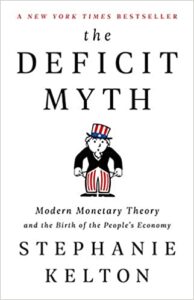
 by DJ RippertSaving America’s bacon.
by DJ RippertSaving America’s bacon.
In 2010 Jim Bacon, blogrunner of this site, wrote a book titled Boomergeddon. The sub-title of the book is, “How Runaway Deficits and the Age Wave Will Bankrupt the Federal Government and Devastate Retirement for Baby Boomers Unless We Act Now.” The book is well written and contains considerable supporting detail but that sub-title pretty much sums things up. At the time of publication Bacon’s book amplified the conventional wisdom of the day — deficits are bad and, as our president might say, big deficits are bad bigly. That traditional belief has come under scrutiny lately. One leading critic of the theories espoused by Boomergeddon is Stephanie Kelton, an economics professor at Stony Brook University and former advisor to the Sanders campaign. Her new book, published in 2020, is titled, The Deficit Myth. One paragraph from the description of Kellon’s book on Amazon.Com sums up her thesis vis-a-vis Boomergeddon. “Kelton busts through the myths that prevent us from taking action: that the federal government should budget like a household, that deficits will harm the next generation, crowd out private investment, and undermine long-term growth, and that entitlements are propelling us toward a grave fiscal crisis.” Kelton believes the United States has considerably more room to incur debt without causing economic harm and we should get about the business of incurring more debt. Paying homage to her Democratic-Socialist roots, Kellon sub-titled her book, “Modern Monetary Theory and the Birth of the People’s Economy.”
Bacon, like Orwell, was an optimist. Since Jim Bacon’s opinions on monetary and fiscal policy are well known to readers of this blog I’ll bypass the opportunity to write a book review of Boomergeddon. However, a quote from the very first chapter is instructive. The context is the budget surpluses that occurred during the Clinton Administration and a speech Clinton gave in 2001 during his “farewell address.”
Bacon wrote in 2010, “The total national debt has surged past the $13 trillion mark — more than double the level when Clinton gave his speech — and the Obama Administration has forecast that the nation will surpass $20 trillion by 2020.” Well it’s 2020 (for better or for worse) and the actual US debt as of May 1 is just under $25 trillion. As of July the total national debt reached $26.5 trillion. Last July the national debt totaled $22 trillion so even without Coronavirus the Obama Administration’s estimates undershot the mark.
The people’s economy. Professor Kelton doesn’t just dismiss the dangers of national debt she actively embraces national debt as a major tool available to solve society’s ills. Her thinking is now generally described as Modern Monetary Theory (MMT). Ms. Kelton’s thinking and MMT are somewhat complex and counter-intuitive. Those seeking to understand these matters in detail would be well advised to buy Kelton’s book and read it. For the purposes of this post I’ll try to summarize my understanding of MMT rather than discuss the specifics of Ms. Kelton’s book. In admittedly over-simplified terms based on this article, MMT holds that:
- Federal government debt is different than other kinds of debt because the federal government can create the money it needs to repay its debt. The federal government is described as the monopoly currency issuer. Neither states nor localities nor households can create money and therefore do not fit this definition.
- The federal government is immortal and will never have to pay its debt down to zero. When federal bonds come due they can be paid off by issuing new bonds. The federal government can also pay the interest on accumulated debt by “printing” more money.
- Government spending is good and the only legitimate constraint on spending should be inflation, which can break out if the public and private sectors spend too much at any given time. Absent inflation the government can spend whatever it believes necessary to maintain employment (including the provision of guaranteed employment) and solve social issues like crumbling infrastructure and climate change.
- In periods of low inflation taxes are not necessary to fund government spending. However, they are useful in reducing income and wealth inequality.
- Deficits that are too big will spark inflation but that can be managed by taking money out of circulation through reduced spending and increased taxes.
- Economies should not be managed through interest rates, which only serves to enrich the “investor class.” The right rate of interest for a country with fiat currency is zero. Business investments are made based on the potential for future gain rather than the cost of money.
- As the Bloomberg article states, “They [MMT advocates] want a nation’s central bank to do the bidding of its treasury. So when the treasury needs money, the central bank accommodates it with a keystroke—creating base money from thin air by crediting the treasury’s checking account.”
How different are Boomergeddon and MMT?
In corporate terms, MMT advocates believe the United States has more debt capacity than it is using. The government’s unwillingness to use the remaining capacity is a drag on our ability to quickly recover from COVID19 and grow in the future. Deficit hawks (like Jim Bacon) believe that we have either exhausted our debt capacity or are well on track to blow through the invisible “debt ceiling.” Both philosophies understand that there is a point where there is too much debt. Both accept that exceeding the debt threshold will cause significant economic problems. The difference is that those who toe the Boomergeddon line envision excessive debt causing long running fiscal mayhem while the MMT people see no more than a temporary problem that can be solved with tuning through higher taxes and spending cuts. When America’s economic “car” breaks through the guardrail of too much debt and flies out over the cliff, Boomergeddon-ites recite the Hail Mary while MMT-ers confidently say to themselves, “No problem, we’ve got airbags.”
How much do you trust our government? Given that nobody seems to know where the debt ceiling lies, our current path is bound to put us through that ceiling sooner or later. This is true regardless of whether Republicans or Democrats are running the country. Today, both parties seem to be modern monetary theorists now. Why not? In the words of Dire Straits, “Money for nothing …”
But what happens if interest rates do start rising? Would our government really have the gumption to simultaneously raise taxes and cut spending? I don’t see it. Congress would dither, dally and delay. The fops and dandies of D.C. would spend their days studying the weather vane of public opinion and wondering how to get reelected. The moment for an MMT “soft landing” would pass and existential Boomergeddon would be full on us. But that’s all in the future. For now the debt ceiling is somewhere over the rainbow and both parties want to turn up the dials on the metaphorical printing presses in D.C.
Implications for Virginia. Regardless of this fall’s elections, massive increases in deficit spending and national debt are going to occur. Before the end of this calendar year our national debt will be much closer to $30 trillion than the $20 trillion predicted by the Clinton Administration in 2001.
In the immediate term Virginia’s state government should cease and desist making payments to help those most affected by Coronavirus. Instead, we should instruct our Congressional delegation to demand that the monopoly issuer of currency (i.e. our federal government) make massive payments in aid to states. Why deplete our reserves or further tax our citizens when the Feds have the goose that lays the golden eggs? Go goose go. Ginny needs a new pair of shoes.
Over the mid term (2021 General Assembly Session) state taxes should be dramatically cut. Assuming inflation remains low it is more efficient for the federal government to create money to solve issues like global warming than for the state to tax its citizens for that purpose. Alternately, continue taxing but keep building the reserves rather than spending it away. The real “rainy day” may be a monsoon the likes of which we cannot imagine. Virginia has 6% of annual state expenditures in its rainy day fund, Wyoming has 109%. Be like Wyoming.
Over the long term, first get used to the fact that the states will have very little power. In a world where the federal government can create money out of thin air (so long as inflation remains low) we should expect the federal government to call the shots. The real golden rule is that he who has the gold makes the rules. The reality that the all-powerful federal government will be run by either Sleepy Joe or Agent Orange is disquieting in the extreme but the feds will call the shots. The second long term task is to find an alternative value store for Virginia’s money in the amped up rainy day funds. Gold, silver, Euros or even bitcoin need to be investigated. Land usually holds its value in times of hyper-inflation. Maybe the state should buy up private landholdings. But one thing for sure — holding U.S. dollars as a hedge against the U.S. dollar crashing would be pretty stupid.

Leave a Reply
You must be logged in to post a comment.